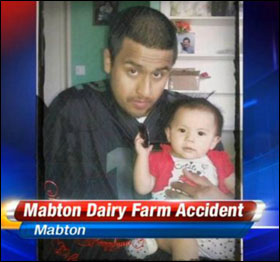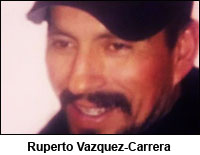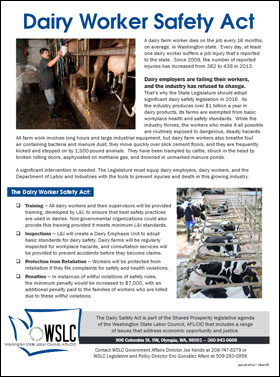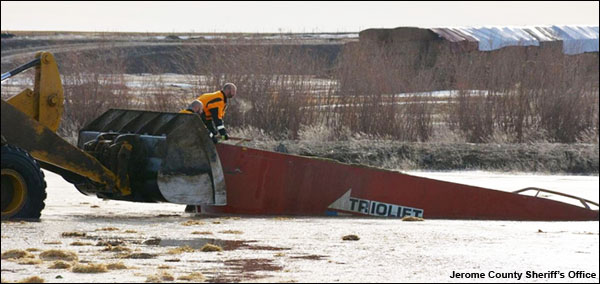STATE GOVERNMENT
Another dairy worker drowns in manure pit
By DAVID GROVES
The Stand
 OLYMPIA (March 16, 2016) — On Feb. 24, 2015, dairy worker Randy Vasquez drowned in an unmarked and unlit manure pit, trapped under an overturned front-end loader, and wasn’t discovered until several hours later. This tragedy at the Riverview Ranch Dairy in Mabton, Wash., spurred proposed legislation to improve dairy safety standards in Washington state. That bill, the Dairy Worker Safety Act/HB 2484 sponsored by Rep. Brady Walkinshaw (D-Seattle), failed to pass after aggressive opposition from Darigold and other dairy industry officials, who portrayed Randy’s death as an “anomaly.”
OLYMPIA (March 16, 2016) — On Feb. 24, 2015, dairy worker Randy Vasquez drowned in an unmarked and unlit manure pit, trapped under an overturned front-end loader, and wasn’t discovered until several hours later. This tragedy at the Riverview Ranch Dairy in Mabton, Wash., spurred proposed legislation to improve dairy safety standards in Washington state. That bill, the Dairy Worker Safety Act/HB 2484 sponsored by Rep. Brady Walkinshaw (D-Seattle), failed to pass after aggressive opposition from Darigold and other dairy industry officials, who portrayed Randy’s death as an “anomaly.”
Less than a year after Randy’s death, it has happened again.
Ruperto Vazquez-Carrera, 37, died in a similarly gruesome way on Feb. 16 in the neighboring state of Idaho. Shortly after showing up for work at Sunrise Organic Dairy Farm in Paul, Idaho, he drove off in a feed truck and never returned. Ruperto’s body was found about 10 hours later submerged in a large manure pit (see photo below).
Like Randy, Roberto leaves behind a wife and children.
“It was just a freak accident,” said Sunrise Organic Dairy Farm owner Dirk Reitsma.
How many more “anomalies” and “freak accidents” will it take before basic safety standards and training are extended to dairy farms in the Pacific Northwest? It’s a question for which the United Farm Workers union is demanding an answer.
 TAKE A STAND! — The UFW, which is investigating the circumstances of Ruperto’s death, is asking supporters to send an email urging Idaho Gov. Butch Otter to meet with them regarding dairy safety. In 2013 alone, three dairy workers were killed on the job in Idaho. (The photo of Ruperto at right is from a Go Fund Me page set up to help his family cover funeral expenses.)
TAKE A STAND! — The UFW, which is investigating the circumstances of Ruperto’s death, is asking supporters to send an email urging Idaho Gov. Butch Otter to meet with them regarding dairy safety. In 2013 alone, three dairy workers were killed on the job in Idaho. (The photo of Ruperto at right is from a Go Fund Me page set up to help his family cover funeral expenses.)
Washington State Labor Council President Jeff Johnson said:
“Agriculture, along with construction, is one of the most dangerous industries in America. Accidents in the dairy industry in Washington state are higher than agriculture as an industry. How many more deaths like Randy’s and Ruperto’s will it take before the dairy industry and Darigold recognize that there are serious health and safety hazards that require immediate mitigation? Why is supervision and training so lax in this industry that the bodies of both men were not discovered for hours after their deaths?
“Darigold’s refusal to sit down and work with the Washington State Labor Council and the United Farm Workers union to work on a joint health and safety training program led to HB 2484 being introduced into Washington’s State Legislature. Rather than denying that a problem exists, the dairy industry should have welcomed HB 2484 as a solution that would have enhanced safety and health training for workers and supervisors, required more safety inspections, increased death benefits to survivors of these tragic deaths, and protected workers from retaliation for reporting safety hazards. Creating a safer workplace, apart from being the right thing to do, has the extra benefit of increasing the industry’s employment retention rate and lowering workers’ compensation costs. It is time to take action in our dairies!”
 In Washington state, one person is killed, on average, every 16 months on a dairy farm and at least one dairy worker per day suffers an injury serious enough to be reported to the state, an injury rate nearly 40 percent higher than most private industries. And the number of injuries has been rising. According to state data, 362 dairy workers were injured in 2009, 438 were hurt in 2013, and 444 were injured in 2014.
In Washington state, one person is killed, on average, every 16 months on a dairy farm and at least one dairy worker per day suffers an injury serious enough to be reported to the state, an injury rate nearly 40 percent higher than most private industries. And the number of injuries has been rising. According to state data, 362 dairy workers were injured in 2009, 438 were hurt in 2013, and 444 were injured in 2014.
At a Jan. 18 hearing on HB 2484 in the House Labor Committee, Alberto Garcia, who worked in the dairy industry for 20 years, described being trampled by a bull for 30 minutes with no one around to help him. He ended up in a coma in a Seattle hospital with severe internal injuries and barely survived. Since then, he has suffered physically and psychologically, and his family has suffered financially.
“I don’t want that to happen to other families because there is no safety and training for the workers,” Garcia told the committee. “Hopefully, you can do something about that.”






